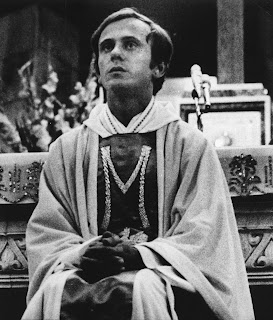Jerzy Popiełuszko was a priest from Poland associated with the Solidarity union. He was murdered by the agents of internal intelligence agency, the Służba Bezpieczeństwa, (eng: Security Service of the Ministry of Internal Affairs). Popiełuszko was a charismatic priest who was first sent to strikers in the Warsaw Steelworks. Thereafter he was associated with workers and trade unionists from the Solidarity movement who opposed the Communist regime in Poland. He was a staunch anti-communist, and in his sermons, interwove spiritual exhortations with political messages, criticizing the Communist system and motivating people to protest. During the period of martial law, the Catholic church was the only force that could voice protest comparatively openly, with the regular celebration of Mass presenting opportunities for public gatherings in churches. Popiełuszko’s sermons were routinely broadcast by Radio Free Europe, and thus became famous throughout Poland for their uncompromising stance against the regime. The Służba Bezpieczeństwa tried to silence or intimidate him. When those techniques did not work, they fabricated evidence against him; he was arrested in 1983, but soon released on intervention of the clergy and pardoned by an amnesty. A car accident was set up to kill Jerzy Popiełuszko on October 13, 1984, but he escaped it. The alternative plan was to kidnap him, and it was carried out on October 19, 1984.The priest was beaten and murdered by three Security Police officers. Then, his body was dumped into the Vistula Water Reservoir near Włocławek from where it was recovered on October 30, 1984.[2] News of the political murder caused an uproar throughout Poland, and the murderers and one of their superiors were convicted of the crime. More than 250,000 people attended his funeral, including Lech Wałęsa on November 3, 1984. Despite the murder and its repercussions, the Communist regime remained in power until 1989.
(From Wikipedia)
(From Wikipedia)












